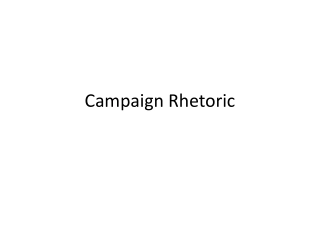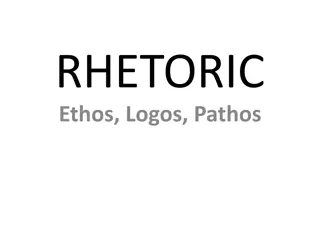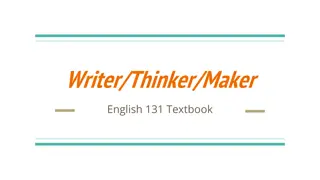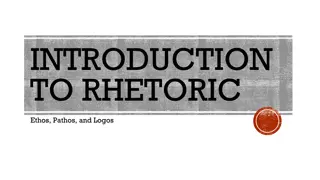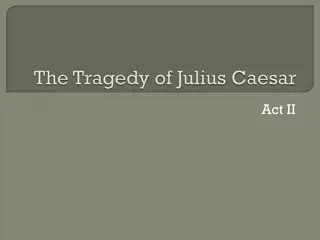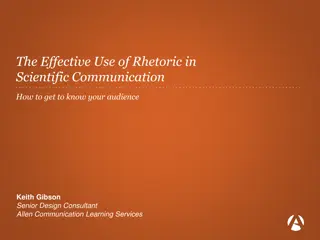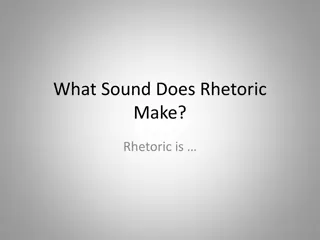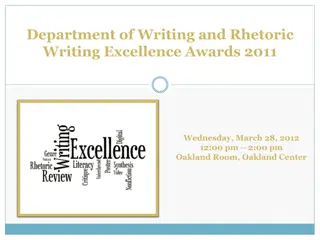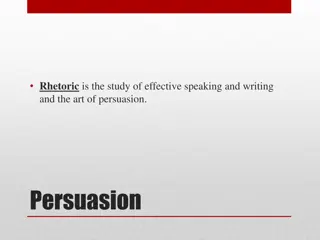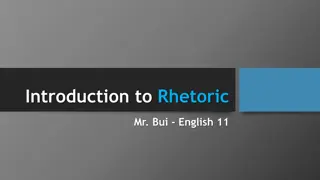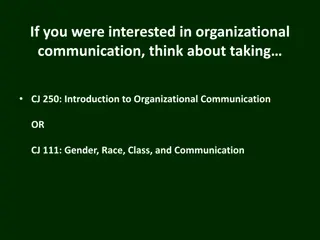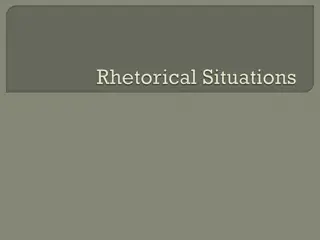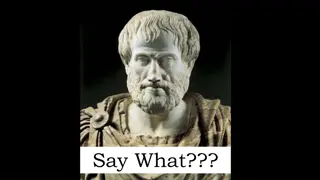Understanding Rhetoric in College Writing
Exploring the significance of rhetoric in college writing, this content highlights the essence of situated communication, rhetorical situations, and the use of various devices in analyzing texts such as political speeches and hip-hop culture. It emphasizes the importance of understanding author purpose, rhetorical elements, and the components of the rhetorical situation in academic writing.
Download Presentation

Please find below an Image/Link to download the presentation.
The content on the website is provided AS IS for your information and personal use only. It may not be sold, licensed, or shared on other websites without obtaining consent from the author. Download presentation by click this link. If you encounter any issues during the download, it is possible that the publisher has removed the file from their server.
E N D
Presentation Transcript
Transition to College English How do we use writing in our everyday lives? What is college writing? What is the Framework for Success in Postsecondary Writing?
Basic definition Rhetoric is: SITUATED COMMUNICATION (rhetorical situation) Communication in some context The art of speaking or writing effectively and persuasively in a particular context (context = a social space, i.e., classroom, work environment, dinner gathering) Forms of communication that are shaped by a particular social situation Rhetor s purpose: to inform, to persuade, to entertain
Example: Studying Rhetoric in Politics Studying the rhetoric of political speeches might include: Understanding how politicians use language to persuade Looking at their non-verbal cues such as facial expressions, hand movements, etc. Considering how politicians use tone and intonation to get a rise out of the audience
Expanding the Definition of Text Studying the rhetoric of some text means understanding all relevant communicative devices (a text = anything that communicates, not just written texts) -this includes written devices, spoken devices, nonverbal gestures, or actual objects (i.e. an outfit)
Examples of Texts Studying the rhetoric of hip-hop could include: Analyzing song lyrics, beats, styles of hip-hop Considering clothing styles Thinking about messages Considering how rap videos define hip-hop culture (in other words, we d study different rhetorical moves or strategies that define hip-hop)
College writing often entails reading rhetorically and writing rhetorically. Studying the rhetoric of a text Author purpose, intended audience, and author ethos Rhetorical elements a writer uses to achieve his or her purpose pattern of organization (narrative, cause/effect, definition, etc.) rhetorical appeals (logos, pathos, ethos) types of evidence (facts, statistics, expert testimony, narratives, observational description, etc.) diction (persuasive, connotative language, and biased language; specific and descriptive word choice; figurative language; active verbs, etc.) syntax (sentence structure such as sentence length and variety; repetition)
Elements of the rhetorical situation Classic author-speaker/text/audience relationships that guide arguments; author s purpose and stance, audiences, texts, and contexts (socio-cultural-historical.)
Readers and Writers in Context Image from: Lunsford, Andrea; Ruszikiewicz, John J., and Keith Walters. Everything s An Argument, 6thed. Bedford/St. Martin s, 2013.
So . . . what does it take to achieve success in college writing? Rodin s The Thinker, Image from Wikipedia The answer might surprise you . . .
WPA, NCTE, and NWP This Framework describes the rhetorical and twenty- first-century skills as well as habits of mind and experiences critical for college success.
The Habits of Mind Curiosity the desire to know more about the world. Openness the willingness to consider new ways of being and thinking in the world. Engagement a sense of investment and involvement in learning. Creativity the ability to use novel approaches for generating, investigating, and representing ideas. Persistence the ability to sustain interest in and attention to short- and long-term projects. Responsibility the ability to take ownership of one s actions and understand the consequences of those actions for oneself and others. Flexibility the ability to adapt to situations, expectations, or demands. Metacognition the ability to reflect on one s own thinking as well as on the individual and cultural processes used to structure knowledge. See handout from the Framework on pp. 4-5 for extended descriptors.


